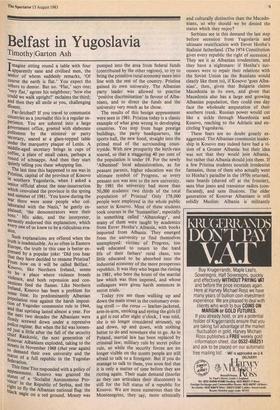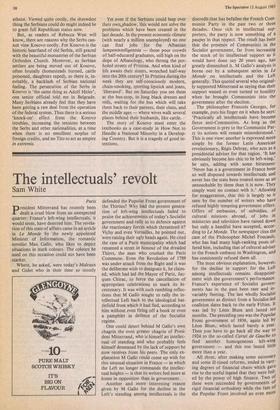Belfast in Yugoslavia
Timothy 1Garton Ash
Imagine sitting round a table with four apparently sane and civilised men, the senior of whom suddenly remarks, 'Of course the earth is flat.' You expect the others to demur. But no. 'Flat,' says one; `very flat,' agrees his neighbour; 'how else could we walk upright!' exclaims the third; and then they all smile at you, challenging dissent.
Far-fetched? If you travel to communist countries as a journalist this is a regular ex- perience. You are ushered into a large government office, greeted with elaborate Politeness by the minister or party secretary, seated at a glass-topped table under the marquetry plaque of Lenin. A middle-aged secretary brings in cups of coffee, a plate of small cakes, perhaps a round of schnapps. And then they start quietly telling you these whopping lies. The last time this happened to me was in Pristina, capital of the province of Kosovo in southern Yugoslavia, when I asked a senior official about the near-insurrection which convulsed the province in the spring and summer of 1981. 'You know during the War there were some people who col- laborated with the Nazis,' he gently ex- Plained; 'the demonstrators were their sons' His aides, and the interpreter, earnestly endorsed this explanation, which every one of us knew to be a ridiculous eva- sion.
Such explanations are offered when the truth is inadmissible. As so often in Eastern Europe, the truth in this case is better ex- pressed by a popular joke: 'Did you hear that they have decided to rename Pristina? Prom now on it will be called Belfast.' osovo, like Northern Ireland, seems be a place where violence breeds Violence and both repression and con- cessions feed the flames. Like Northern Ireland, Kosovo has been a problem for some time. Its predominantly Albanian Population rose against the harsh imposi- tion of Yugoslav communist rule in 1944, and that uprising lasted almost a year. For te next two decades the Albanians were rrnlY screwed down under a repressive Police regime. But when the lid was loosen- ed just a little after the fall of the security 5lief Rankovic, the next generation of Kosovar Albanians exploded, taking to the streets in November 1968 (that year again) to demand their own university and the status of a full republic in the Yugoslav federation. This time Tito responded with a policy of sappeasement. Kosovo was granted the vatus of a 'Socialist Autonomous Pro- !nce' in the Republic of Serbia, and the right to fly the Albanian national flag: the black eagle on a red ground. Money was
pumped into the area from federal funds (contributed by the other regions), to try to bring the primitive rural economy more into line with the rest of the country. Pristina gained its own university. The Albanian party leader was allowed to practise 'positive discrimination' in favour of Alba- nians, and to direct the funds and the university very much as he chose.
The results of this benign appeasement were seen in 1981. Pristina today is a classic example of what goes wrong in developing countries. You step from huge prestige buildings, the party headquarters, the sports hall, the new hotel, straight into the primal mud of the surrounding coun- tryside. With new prosperity the birth-rate soared, so that a staggering 40 per cent of the population is under 19. For the newly `Albanised' local administration, as for peasant parents, higher education was the ultimate symbol of Progress, so every peasant son was sent to the new university. By 1981 the university had more than 50,000 students: two thirds of the total population of Pristina! Only 178,000 people were employed in the whole public sector in Kosovo. Most of these students took courses in the 'humanities', especially in something called 'Albanology', and many of them were taught by academics from Enver Hoxha's Albania, with books imported from Albania. They emerged from the university to find themselves unemployed: victims of Progress, too well educated to return to the hard life of their fathers' rural clans, too little educated to be absorbed into the industrial economy of the more prosperous republics. It was they who began the rioting in 1981, who bore the brunt of the martial law which was then imposed, and whose colleagues were given harsh sentences in secret trials.
Today you see them walking up and down the main street in the customary even- ing stroll — the torso — leather-jacketed, arm-in-arm, smoking and eyeing the girls (if a girl is out after eight o'clock, I was told, she is no longer considered serieuse), up and down, up and down, with nothing better to do and nowehere else to go. As in Poland, martial law has been replaced by criminal law, military rule by secret police rule, so while the security forces are no longer visible on the streets people are still afraid to talk to a foreigner. But if you do manage to talk to them, you soon feel that it is only a matter of time before they are rioting again. Their main demand (insofar as they can articulate their discontent) is still for the full status of a republic for Kosovo. We are more numerous than the Montenegrins, they say, more ethnically
and culturally distinctive than the Macedo- nians, so why should we be denied the status which they enjoy?
Serbians see in this demand the last step before secession from Yugoslavia and ultimate reunification with Enver Hoxha's Stalinist fatherland. (The 1974 Constitution gives every republic the right of secession.) They see it as Albanian irredentism, and they have a nightmare: if Hoxha's suc- cessors were to repair their relations with the Soviet Union (as the Russians would clearly like them to), if Kosovo 'goes Alba- nian', then, given that Bulgaria claims Macedonia as its own, and given that Macedonia also has a large and growing Albanian population, they could one day face the wholesale amputation of their southern trunk. Russian power would cut like a sickle through Macedonia and Kosovo, reaching to the Adriatic and en- circling Yugoslavia.
These fears are no doubt greatly ex- aggerated. The Albanian communist leader- ship in Kosovo may indeed have had a vi- sion of a Greater Albania: but their idea was not that they would join Albania, but rather that Albania should join them. If a few Pristina students nourish irredentist fantasies, those of them who actually went to Hoxha's paradise in the 1970s returned, sans beards (shaved off at the frontier), sans blue jeans and transistor radios (con- fiscated), and sans illusions. The older generation of Kosovar Albanians is still solidly Muslim: Albania is militantly atheist. Viewed quite coolly, the shrewdest thing the Serbians could do might indeed be to grant full Republican status now.
But, as readers of Rebecca West will know, there are reasons why the Serbs can- not view Kosovo coolly. For Kosovo is the historic heartland of old Serbia, still graced with the beautiful monastries of the Serbian Orthodox Church. Moreover, as Serbian settlers are being moved out of Kosovo, often brutally (homesteads burned, cattle poisoned, daughters raped), so there is, in- evitably, a backlash of Serbian national feeling. The persecution of the Serbs in Kosovo is 'the same thing as Adolf Hitler', one senior official told me in Belgrade. Many Serbians already feel that they have been getting a raw deal from the operation of the federal system. Thus there is a serious `knock-on' effect from the Kosovo troubles, increasing the tensions between the Serbs and other nationalities, at a time when there is no emollient surplus of foreign credits, and no Tito to act as umpire in extremis.
Yet even if the Serbians could leap over their own shadow, this would not solve the problems which have been created in the last decade. In the present economic climate (with nearly a million unemployed) no one can find jobs for the Albanian lumpenintelligentsia — those poor crowds of half-educated graduates, still high on the dope of Albanology, who throng the pot- holed streets of Pristina. And what kind of life awaits their sisters, wrenched half-way into the 20th century? In Pristina during the week they are self-consciously modern, chain-smoking, sporting lipstick and jeans, `liberated'. But on Saturday you see them at the bus-stop, in long black dresses and veils, waiting for the bus which will take them back to their parents, their clans, and the middle ages — where wives walk several places behind their husbands, like cattle.
The story of Kosovo must enter the textbooks as a case-study in How Not to Handle a National Minority in a Develop- ing Country. But it is a tragedy of good in- tentions.







































 Previous page
Previous page